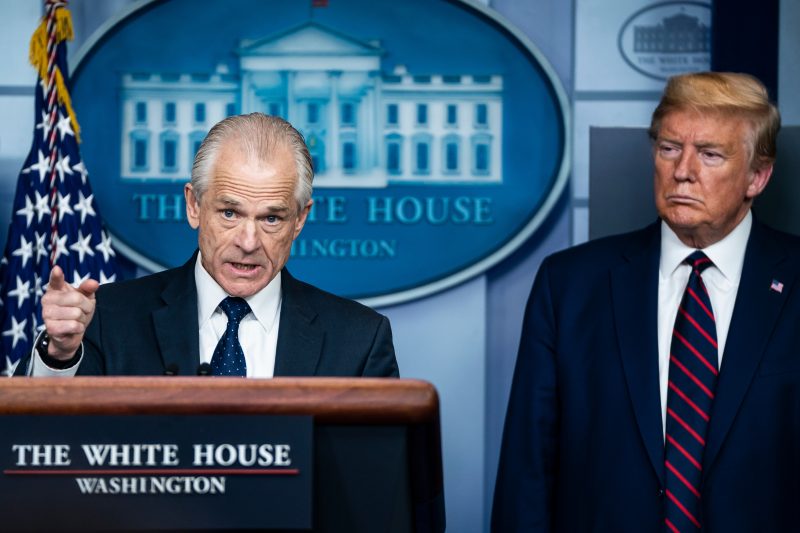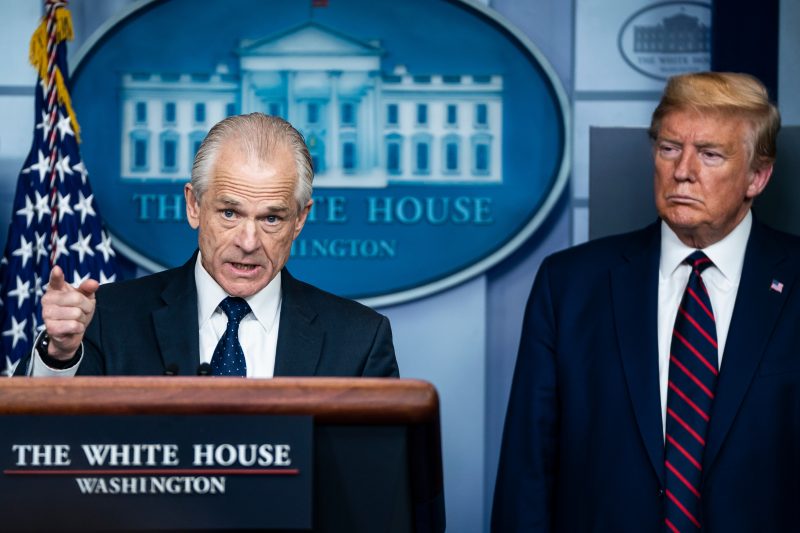
A federal judge on Thursday ordered former Trump White House aide Peter Navarro to begin serving a four month-prison term for ignoring a subpoena from the House committee investigating the Jan. 6, 2021, Capitol attack, rejecting his request to stay free while he appeals his conviction on two counts of criminal contempt of Congress.
Navarro, who claimed credit for devising a plan to overturn the 2020 election and keep Donald Trump in office, has one more chance to avoid being put behind bars — if he can convince a federal appeals court that his legal challenges are likely to succeed, a premise that his trial judge rejected.
In a 12-page opinion, U.S. District Judge Amit P. Mehta said that none of Navarro’s claims posed a “substantial question of law” or a close call. Unless the U.S. Circuit Court of Appeals for the District of Columbia stays his sentence imposed Jan. 25, Mehta ordered, Navarro “shall report to the designated Bureau of Prisons (“BOP”) facility on the date ordered by the BOP.”
Navarro has not received a reporting date and is expected to ask the circuit court to intervene. His attorneys declined to comment.
Navarro has said he worked on a plan to delay and ultimately change the outcome of Congress’s formal count of the 2020 presidential election results with Stephen K. Bannon, Trump’s former political adviser. Both men refused to provide either testimony or documents as demanded by the House Jan. 6 panel and were convicted of two counts of misdemeanor contempt and sentenced to four months of incarceration. Either man could become the first person incarcerated for defying a congressional subpoena in more than half a century, under a rarely prosecuted offense punishable by up to a year in prison.
Navarro failed where Bannon succeeded, however. Bannon’s October 2022 sentence has been put on hold pending appeal as he argues that he should have been able to stonewall Congress based on a lawyer’s advice or his belief that he was barred from sharing information with the House committee due to executive privilege.
U.S. District Judge Carl J. Nichols rejected both claims, saying Trump failed to invoke the privilege, which preserves the confidentiality of White House discussions from Congress under the Constitution’s separation-of-powers principle. But the judge more reluctantly denied Bannon’s advice-of-counsel defense, citing what he called an arguably outdated precedent, and allowed Bannon to remain free while the question goes before a higher court.
By contrast, Navarro proceeded without a lawyer in brushing off the House panel in claiming the privilege. Mehta found insufficient proof that Trump in fact asserted the privilege for his trade and pandemic adviser. Navarro instead, Mehta found, appeared to rely on a news statement issued by then-president Trump in November 2020 that said Navarro did not have to cooperate with a different committee investigating the pandemic response, more than a year before he received the House Jan. 6 subpoena in February 2022.
Mehta granted that Navarro claimed his case raised an open question in the law: “What does a President, current or former, have to do to properly assert executive privilege?” But Mehta said Navarro has not proposed an answer, failing to meet his legal burden “to show that this question is a ‘close’ one.” Even if executive privilege applied to Navarro’s testimony about conversations with the president, it did not excuse his blanket refusal to appear before Congress and answer other questions, or to produce documents or a log of proposed withholdings, Mehta ruled.
Navarro, 74, who unlike Bannon served throughout Trump’s term in office, was found guilty in September for refusing to speak with lawmakers about his claim of working with him on an operation called “the Green Bay Sweep.” The plan aimed to get Trump loyalists in Congress to contest ballots from six swing states that Biden won and throw the election to the House, though claims of voter fraud were repudiated by state officials and the courts.
Five people died in or shortly after rioting that began on Jan. 6, 2021, after Trump urged his supporters to march to the Capitol. The violence included assaults on least 140 police officers, caused $3 million in damage and forced the evacuation of lawmakers.

